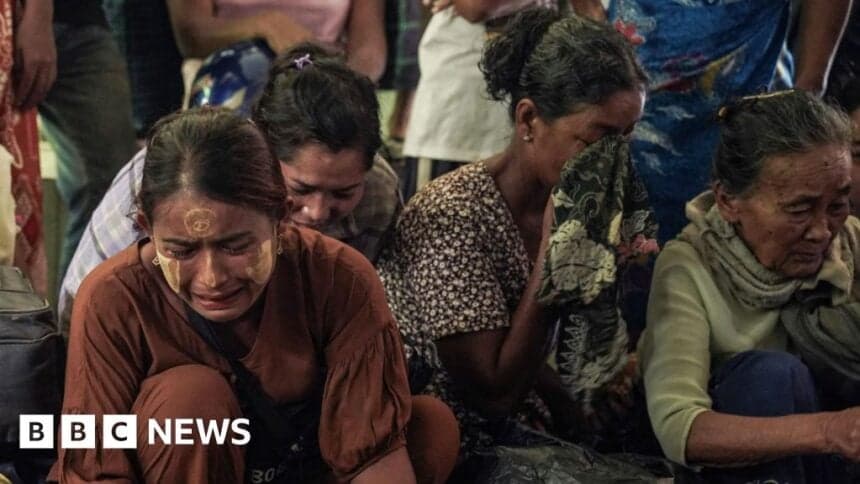We're loading the full news article for you. This includes the article content, images, author information, and related articles.
Myanmar's military junta has recaptured strategic towns, including Kyaukme and Hsipaw, along a vital trade route to the Chinese border, signaling a shift in the ongoing civil war..

Myanmar's military junta has significantly regained territory in recent weeks, notably recapturing the towns of Kyaukme and Hsipaw in Shan State. These towns, situated along Asian Highway 14 – historically known as the Burma Road – are crucial for trade with China. Kyaukme, which had been under the control of the Ta'ang National Liberation Army (TNLA) for several months, was retaken by the military in just three weeks in October 2025. Hsipaw, the last of the towns captured by the TNLA last year, has also fallen back into junta hands, restoring the military's control over the road to the Chinese border.
The recapture of these towns highlights a notable shift in the military balance, largely attributed to the junta's intensified air strikes. Kyaukme, in particular, suffered extensive damage from daily air raids, with jets deploying 500-pound bombs and artillery and drones targeting insurgent positions. Many residents fled the town during the fighting, though some are now reportedly returning. Tar Parn La, a spokesperson for the TNLA, acknowledged the military's increased resources, stating, "This year the military has more soldiers, more heavy weapons, and more air power."
Myanmar has been embroiled in a civil war since the military seized power in a coup d'état in February 2021, ousting the democratically elected government of Aung San Suu Kyi's National League for Democracy (NLD). The coup triggered widespread anti-coup protests, which the military junta, also known as the Tatmadaw, met with violent repression. This led to the formation of armed resistance groups, including the People's Defense Force (PDF), operating under the National Unity Government (NUG), which declared a "defensive war" against the junta in September 2021.
The NLD, co-founded by Aung San Suu Kyi in 1988, had won a substantial parliamentary majority in the 1990 general election, but the results were ignored by the military government. The party also secured landslide victories in the 2015 and 2020 general elections. However, following the 2021 coup, the military made unsubstantiated claims of electoral fraud. Aung San Suu Kyi, a Nobel Peace Prize laureate, has been detained since the coup and faces numerous charges, which her supporters contend are politically motivated to prevent her participation in future elections.
The military junta plans to hold a general election, with the first phase scheduled to begin on Sunday, December 28, 2025. This election, however, has been widely condemned by international observers and opposition groups as a "sham process" designed to legitimize continued military rule. The NLD was dissolved in March 2023 after refusing to comply with a new, restrictive party registration law imposed by the military. The junta has also enacted a law dictating prison sentences of up to 10 years for speech or protests aimed at "destroying a part of the electoral process."
The conflict has had a devastating impact on civilians. Amnesty International reported that military air strikes killed 17 civilians, including nine children, in January 2024, and at least 28 civilians, including 12 children, in an attack on a displaced persons camp in October 2023. The Karen Human Rights Group documented 417 civilian casualties, with 168 deaths and 249 injuries, from 227 airstrikes in civilian areas in the country's southeast. Nyan Lin Thit Analytica reported that junta airstrikes killed over 359 civilians, including 61 children, and injured 756 others in the first four months of 2024.
Humanitarian organizations face significant challenges in reaching those in need due to military restrictions and a hostile environment. The UN's 2024 Humanitarian Response Plan for Myanmar was only 11% funded as of early June 2024, leaving a substantial gap in aid.
China's role in the conflict is increasingly significant. While historically maintaining ties with both the Myanmar military and ethnic resistance organizations, China has recently shown increased support for the junta. This support includes backing the junta's election plan and reportedly pressuring border-sharing ethnic armed groups, such as the TNLA, to avoid collaborating with the PDF or NUG. China's motivations are believed to include protecting its extensive economic investments in Myanmar, particularly along the China-Myanmar Economic Corridor.
The intensified conflict and the junta's reliance on air power pose significant risks to civilians, with reports of indiscriminate targeting and collective punishment. The humanitarian crisis continues to worsen, with a substantial funding gap for aid efforts.
The credibility of the upcoming December 2025 elections remains a major point of contention. International bodies and opposition groups view them as an attempt by the junta to legitimize its rule without genuine democratic processes. The extent to which China's influence will shape the outcome of the conflict and the future political landscape of Myanmar is also an ongoing area of concern and speculation. While China has historically sought stability, its recent actions suggest a more direct alignment with the junta.
Observers will closely monitor the upcoming December 2025 elections for their legitimacy and the international community's response. The trajectory of China's involvement and its impact on the conflict dynamics, particularly along the border regions, will also be a critical area to watch. Furthermore, the humanitarian situation and the ability of aid organizations to reach affected populations will remain a pressing concern.
Keep the conversation in one place—threads here stay linked to the story and in the forums.
Sign in to start a discussion
Start a conversation about this story and keep it linked here.
Other hot threads
E-sports and Gaming Community in Kenya
Active 9 months ago
The Role of Technology in Modern Agriculture (AgriTech)
Active 9 months ago
Popular Recreational Activities Across Counties
Active 9 months ago
Investing in Youth Sports Development Programs
Active 9 months ago